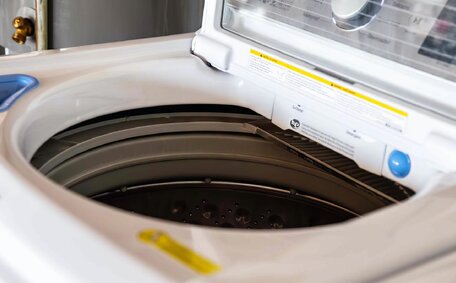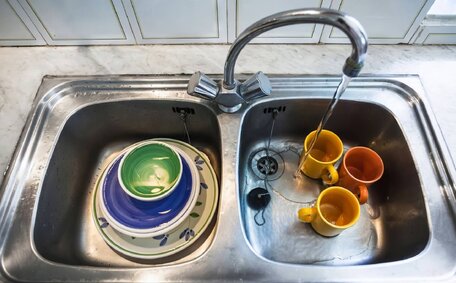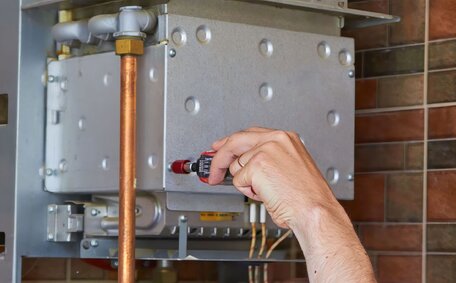Understanding Common Plumbing Emergencies
In the realm of plumbing emergencies within the home, it’s crucial to be well-equipped and knowledgeable about what to do to truly make a difference. When it comes to common emergency situations, examples include burst pipes, blocked drains, gas leaks, and sewer line backups.
Burst pipes commonly occur in winter when freezing temperatures cause pipes to expand and contract. A burst pipe can cause damage through severe flooding if not addressed quickly. Warning signs of a failing hot water heater include sudden water pressure loss, reduced hot water, and water marks on walls or ceilings.
Blocked drains can also quickly become an emergency if sewage backs up into your home. Signs of a clog include slow-flowing water, gurgling sounds, bad odours, and overflowing sinks or toilets when flushed. Call professional assistance if home remedies fail, as they have the right tools and expertise to clear the blockage.
Gas leaks are extremely hazardous, posing risks to electrical appliances; immediate action entails calling emergency services. If you smell rotten eggs, take action soon possible by evacuating the area, not turning any electrical switches on or off, and call your local fire department and gas company.
A sewer line backup causing sewage to back up into your home also warrants an urgent response. Call a specialist who can manage plumbing emergencies right away if you notice the affected area with water bubbling up from floor drains or very slow draining water.
When it comes to recognising the signs of common plumbing emergencies, proactive actions can help minimise potential damage and prevent the situation from exacerbating. Have an emergency plan in place for any plumbing situation to prevent further issues and know when to call in the professionals. Staying alert and acting promptly, without a do panic mindset, to call your plumber is key for safeguarding your house amidst a crisis.
Locating and Familiarizing with Main Water Valve
Knowing how to turn off the main water supply valve is crucial when preparing for potential emergencies. The main shutoff valve allows you to make sure the flow of water into your home’s plumbing system stops, potentially saving your home from extensive harm due to issues like burst pipes or leaks.
Start by tracing your water metre to locate where your main water line enters your home. If you’re uncertain about how to shut off water, look for typically a red or blue handle on a pipe coming out of the wall or floor.
Once located, label the off water valve with a clear tag saying "Turn Off Main" to ensure it can be easily identified in an emergency. Ensure all your family members know where it is and how to shut off the water supply when necessary.
Turning off main water valve halts the flow of both hot and cold water to taps, toilets, water heaters and other appliances. Shutting off the water can mitigate flooding, as having the knowledge to turn off your water can minimize damage while waiting for the plumber’s arrival. Taking the time to pinpoint, examine and tag your main valve for shutoff can save significant distress should calamity strike.
Assembling a Plumbing Emergency Kit
Be Prepared: Your Plumbing Emergency Kit
In plumbing emergencies, your best defence is an emergency plumbing kit, ready for use when they arrive. We highly recommend maintaining a reserve of proper tools and resources that can help minimise damage from leaks and spills before professional help arrives, potentially saving you time, money, and unnecessary stress.
Include these critical items in your emergency plumbing kit:
- Buckets and basins: These are vital for containing excess water that can accumulate from leaks, overflows, or spills.
- Towels and rags: Use them to mop up excess water and protect surfaces from water damage.
- A mop and bucket: For cleaning up standing water stemming from a plumbing issue, which can cause hazardous slippery surfaces.
- Plungers: Essential for unclogging sinks, toilets, and showers.
- Household tools: You’ll need wrenches, screwdrivers, pliers, and an adjustable wrench to tighten and loosen connections and handles.
- Duct tape and pipe wrap: Temporary fixes for small leaks in pipes.
- Plumber’s putty: A useful compound for sealing minor leaks around faucets and drains.
- Pipe insulation: Protect exposed pipes from freezing temperatures to prevent bursts.
Keep your plumbing emergency kit in a designated spot that’s easy to access, so you know what do plumbing while urgency strikes. Even a bit of foresight can go long way towards mitigating the impacts of a sudden plumbing crisis.
Reviewing Insurance Policy Coverage
Unravelling Your Insurance Safety Net
It’s essential to understand your insurance policy’s coverage for plumbing emergencies. Knowing what’s protected can provide peace of mind and help avoid unexpected repair costs.
Follow these crucial steps to stay informed and avoid further damage:
- Carefully review your policy: Familiarise yourself with the details of your coverage related to water damage and plumbing problems on your property.
- Check for specific inclusions and exclusions: Some policies may not cover certain types of water damage, such as floods, or damage caused by lack of maintenance.
- Understand your deductible: Knowing the amount you’ll pay out-of-pocket before insurance takes effect is crucial for budgeting emergency repairs.
- Update your policy if necessary: If your policy lacks coverage for specific plumbing issues, you might end up discussing options with your insurance agent to expand your protection.
Don’t forget to examine any additional living expenses coverage that might be available if you need to temporarily relocate during extensive repairs. By thoroughly reviewing your insurance policy and understanding coverage, you can ensure you’re well-prepared on your own for any plumbing emergencies that may arise.
Identifying and Selecting Emergency Plumbers
When a plumbing emergency strikes, having a reliable emergency plumber on call can make all the difference for other plumbing needs as well. To prepare, research and compile a list of experienced plumbers in your area, especially those offering 24/7 emergency support.
Look for a reputable plumbing company with licensed professionals experienced in resolving urgent plumbing issues. Check reviews and testimonials to verify quality of service. Obtain their contact details like phone numbers and email addresses so you can reach them any time of day.
Shortlist 2-3 preferred plumbers to ensure you have back-ups available. Save their details directly into your phone for quick access when disaster strikes. Knowing which plumbing services to contact for urgent assistance and having their information at the ready can help resolve emergencies swiftly, preventing further problems.
Creating a Detailed Floor Plan
Creating a detailed floor plan with your home’s key plumbing components marked can be invaluable for swiftly locating issues during emergencies. When time is critical, a floor plan helps identify where water lines, drains, and shutoff valves are situated underneath sinks, behind walls, and in cramped spaces.
Start by sketching out each level of your home, ensuring all rooms are represented. Mark locations such as heaters, toilets, and sinks where water needs to be switched off, using a legend for clarity. Also indicate routes for supply lines and waste lines between fixtures and connection points.
Use bold lines to indicate shutoff valve positions for essential components such as hot water systems and taps. This allows anyone to quickly stem flows via isolation, making it as important as any other immediate measure. Include measurements to provide scale and record the date the plan was drawn.
Store printed copies of your floor plan near emergency plumbing equipment for easy access. Save digital copies on smartphones and back them up so they remain available offline. Keeping an accurate, up-to-date floor plan on hand can make a stressful situation more manageable.
Implementing Preventative Maintenance
Being proactive and performing regular maintenance on your plumbing system is one of the best ways to avoid emergency situations. Simple preventative tasks can identify issues before they escalate into major problems.
Conduct monthly inspections of pipes, recording observations of joints, valves, and fixtures. Check for signs of leakage, corrosion, cracks or damage. Take care to tighten any loose connections and replace worn washers and seals promptly.
Annually, have a licenced plumber inspect hard-to-reach components like your water heater. They can check heaters for buildup, faulty parts and pressure relief valves.
Routinely clean your drains in sinks, baths, showers and laundry areas to remove hair and soap residue. Use a drain snake monthly to clear obstructions before they worsen. The application of drain cleaners like grease solvents also helps to maintain unobstructed drains.
Prevent freezing and pipe bursts by insulating pipes in unheated areas of your home during winter. Ensure outdoor taps are turned off and drained prior to the cold season.
By being vigilant and addressing minor issues early, you protect your system from major failures. Implementing basic preventative maintenance tasks is time and money well spent.
When to Call a Professional Plumber
There are certain plumbing situations that require calling in a licenced professional rather than attempting a DIY fix. If you experience major flooding, sewage backups, gas leaks, or complete loss of water service, immediately call our emergency plumbing team at Parramatta Plumbing on 1300 349 338.
Professional help is essential when facing extensive water damage, hazardous electrical issues or health risks from contamination. Our skilled technicians can quickly identify and repair problem spots, ensuring safety, and reinstating your plumbing to dependable functionality.
A professional assessment by a reliable plumbing service is vital rather than a try fix approach if you are unsure of the root cause of persistent clogs, leaks or pipe damage. Improper repairs can fail to fix problems and instead worsen issues over time. Our team takes the guesswork out of diagnosing problems through methodical troubleshooting, specialised equipment, and years of practical experience.
While minor leaks, drips or drainage issues can sometimes be managed through DIY methods, we strongly advise immediately calling us if problems rapidly escalate or you find yourself feeling overwhelmed. We understand plumbing emergencies cause stress, and are here to handle all aspects of remediation so you can focus on getting life back to normal.






